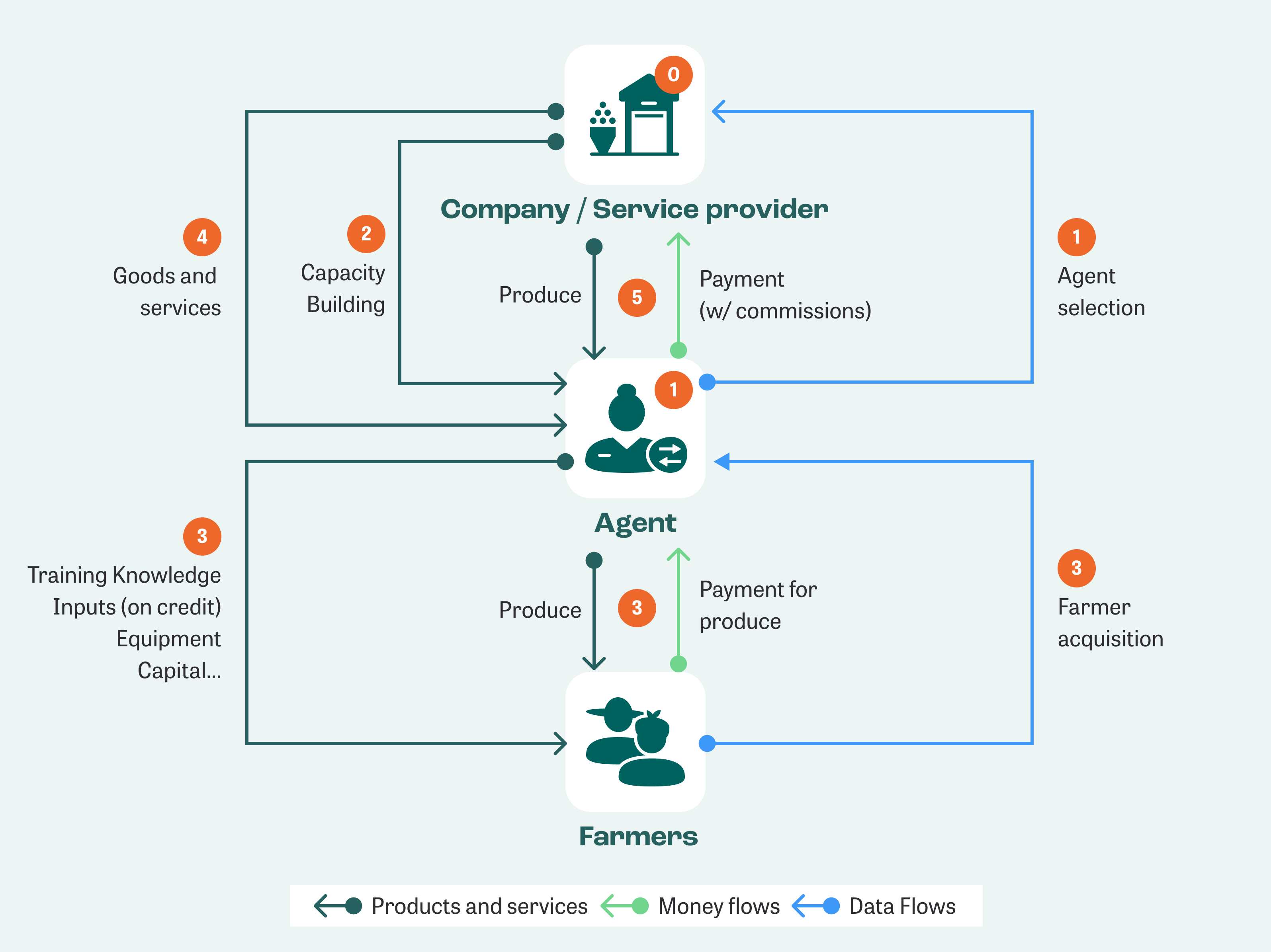Closing Last-Mile Delivery Gaps by Rapidly Building a Commission-Based Agent Network
What is the Innovation?
Agent networks seek to cover the last mile of service delivery, thus bridging gaps between companies and smallholder farmers (SHFs). The agents, who can be farmers themselves, are not part of a company's staff but rather work on a commission basis. Companies may reward, incentivize, and/or graduate agents based on their performance. Agent networks are more cost-effective for companies than solely using own staff, as agents leverage on social connections, flexible availability, and proximity to the farmers. This innovation is also known as community-based agents, rural promoters, last-mile deliverers, village-based agents, agri-entrepreneurs etc.
Key Challenges Addressed
Afro-Kai Limited (AKL) started sourcing directly from SHFs in the last 2 years to improve reliability and quality of supply. This strategy makes the business more inclusive and aligned to governmental priorities, but also poses challenges for the company. Coordinating produce aggregation from many SHFs is a complex process. Many SHFs operate in remote areas with difficult accessibility, hindering logistic efforts. In periods of monetary constrain, SHFs may decide to side-sell to other buyers without notice. SHFs’ limited knowledge on good agricultural practices may result in inconsistent quality, hampering the reach to better markets. To face these challenges, AKL decided to close the last-mile gap by rapidly building and enlarging an organized, properly equipped, and motivated network of commissioned-based agents.
How it Works

Tips for Replication
Context
- Companies source from individual or informally organised farmers
- A high number of scattered farmers is needed to meet the company’s target volumes
- High risk of quality variation due to sourcing from several farmers§High risk of side-selling due to informal value chain
Best Practices
- Experienced 3rd parties (government, NGOs, companies, farmer groups, etc.) can help in rapidly identifying suitable candidates
- Establish clear criteria for selection of agents
- Women agents can reach female farmers better§Agents must have good reputation in the served communities
- Formal contracting with agents (including insurance options) minimize nonrepayment of goods on credit
- Transparent commissions, rewards, and incentives strengthen agent loyalty and reduce attrition rate
- Companies should support agents with capital, equipment and infrastructure to facilitate their work
- A Farm Management Information System (FMIS) supports the M&E of agents’ performance
- Use of technology for quality management (moisture meters, packaging) and information management (e.g., digital scales, FMIS) supports agents to be efficient
- Farmer satisfaction surveys can reveal areas to improve
Enabling Conditions
- Agents must have a minimum level of financial and technological literacy to manage their own business
- Agents must have logistical and financial capacities to collect, quality-control and pay for the farmers’ produce
Business Case
Expected Outcomes for Afro-Kai Limited
Reduced costs
AKL has seen a reduction of its costs by means of a 108-agent network. Procuring through agents has become 23% cheaper as compared to sourcing from traders. Similarly, by relying on agents, costs to deliver services to farmers have decreased by 35%.
More and better produce
Due to the agent networks’ enhanced aggregation capacities, the sourced volumes increased in the last 2 years by ~35% and ~25% for sorghum and maize, respectively. At the same time, training on post-harvest handling practices, timely collection, and proper storage, has ensured higher-quality produce for AKL to participate in more competitive regional markets.
Business Case
Expected Outcomes for the agents
Increased income
Becoming an agent provides an additional source of income for local traders, farmers, and/or community members. Agents receive commissions of 20 UGX/kg of aggregated produce, and 500 UGX/kg of certified seed. Traders and farmers enrolled as agents are likely to increase their incomes by 25% and 30%, respectively.
More jobs for women
More women will be involved into higher-income and more influential roles through AKL’s women agent enrolment initiative. The company expects to operate with 30% of women agents in its network.
Impact Case
Expected Outcomes for smallholder farmers
Better access to markets
Due to the proximity of agents, farmers will have increased access to more affordable services (inputs, training, equipment, etc.), and to more competitive markets. At the same time, farmers will benefit from better prices for their higher-quality produce. These improvements represent a farmer income increase of up to 30%.
Outstanding Risks and Challenges
- While companies have clear criteria for agents’ selection, they typically lack criteria for agent’s performance-based graduation (e.g., higher nr. of served farmers and aggregated volumes).
- Gender roles and disparity may lower participation rates from women agents. For example, husbands may ask their wives to quit their jobs as agents.
- The company’s limited capacity to mobilize working capital and to organize timely logistics and storage, usually limits the agents’ capacity to aggregate produce.
- Agents facing cash constraints during harvesting period are unable to purchase the produce, thus becoming the weakest link in the network.
- In the absence of proper commissions and incentives, undesirable effects like underperformance, high attrition rates, and side-selling may affect the network's profitability.
- Underperforming agents can affect the relationship between farmers and the company.
- Companies can benefit from shared agent networks; however, in lack of clear arrangements that can lead to inefficient investments, redundant efforts, and/or agents misusing resources.
Data Sources & Disclaimer
Information is based on IDH’s Service Delivery Model (SDM) analysis for AKL, including data from AKL and 431 farmers (information is available on our methodology for SDM Analyses and Farmer Surveys). Additionally, interviews with company, agents, and farmers have been held since the start of Technical Assistance (2022) during which the innovation is tested and scaled. A longer time span and additional data are needed to verify and quantify impacts. Farmfit will conduct an end-line assessment of the company’s SDM and farmer livelihoods based on a repeat data collection at company and farm level.
Your Insights Hub journey has just started
Sign up here for access to updates - and industry insights and innovation - from the Smallholder Inclusive Business Newsletter.